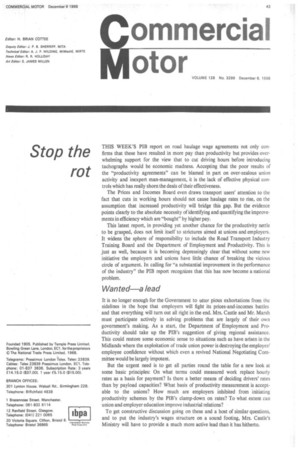Stop the rot
Page 45

If you've noticed an error in this article please click here to report it so we can fix it.
THIS WEEK'S PIB report on road haulage wage agreements not only confirms that these have resulted in more pay than productivity but provides overwhelming support for the view that to cut driving hours before introducing tachographs would be economic madness. Accepting that the poor results of the "productivity agreements" can be blamed in part on over-zealous union activity and inexpert man-management, it is the lack of effective physical controls which has really shorn the deals of their effectiveness.
The Prices and Incomes Board even draws transport users' attention to the fact that cuts in working hours should not cause haulage rates to rise, on the assumption that increased productivity will bridge this gap. But the evidence points clearly to the absolute necessity of identifying and quantifying the improvements in efficiency which are "bought" by higher pay.
This latest report, in providing yet another chance for the productivity nettle to be grasped, does not limit itself to strictures aimed at unions and employers. It widens the sphere of responsibility to include the Road Transport Industry Training Board and the Department of Employment and Productivity. This is just as well, because it is becoming depressingly clear that without some new initiative the employers and unions have little chance of breaking the vicious circle of argument. In calling for "a substantial improvement in the performance of the industry" the PIB report recognizes that this has now become a national problem.
Wanted—a lead
It is no longer enough for the Government to utter pious exhortations from the sidelines in the hope that employers will fight its prices-and-incomes battles and that everything will turn out all right in the end. Mrs. Castle and Mr. Marsh must participate actively in solving problems that are largely of their own government's making. As a start, the Department of Employment and Productivity should take up the PIB's suggestion of giving regional assistance. This could restore some economic sense to situations such as have arisen in the Midlands where the exploitation of trade union power is destroying the employer/ employee confidence without which even a revived National Negotiating Committee would be largely impotent.
But the urgent need is to get all parties round the table for a new look at some basic principles: On what terms could measured work replace hourly rates as a basis for payment? Is there a better means of deciding drivers' rates than by payload capacities? What basis of productivity measurement is acceptable to the unions? How much are employers inhibited from initiating productivity schemes by the PIB's clamp-down on rates? To what extent can union and employer education improve industrial relations?
To get constructive discussion going on these and a host of similar questions. and to put the industry's wages structure on a sound footing, Mrs. Castle's Ministry will have to provide a much more active lead than it has hitherto.








































































































































































